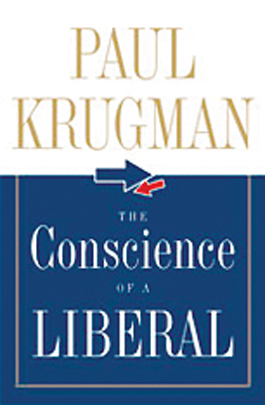home | metro silicon valley index | the arts | books | review

The Conscience of a Liberal
Review by Michael S. Gant
With the passing of Molly Ivins, The New York Times' syndicated columnist Paul Krugman now rings the clarion call of common sense in the face of right-wing demagoguery. In his new book, The Conscience of a Liberal, Krugman lays out in broad-brush terms his analysis of what has gone wrong in this country since World War II. After a period of relative economic equality as a result of the solidification of New Deal politics, the conservative movement fomented a return to the Gilded Age, complete with a widening gap between the elite rich and the middle and lower classes and poisonous political bipartisanship. Robert Reich, in his recent book Supercapitalism, charts the same historical course. But where Reich blames income inequality on technological advances and market forces, Krugman argues that politics—specifically the well-bankrolled free marketeerism of right-wing think tanks and the race-baiting campaigns run by Republicans starting with Nixon—drove economics. Expressing a heretical notion, at least for an economist, Krugman writes, "Middle-class societies don't emerge automatically as an economy matures, they have to be created through political action." Unfortunately, they can be destroyed by political action, too. Evincing an optimism that feels a little forced, Krugman thinks that the Democrats are on the verge of a genuine breakthrough; he even expresses a hope that the health-care crisis can be solved (one of the book's fascinating points is a discussion of how close the country came to a real single-payer system in 1946, only to be thwarted by the American Medical Association). Of course, putting your faith in the Dems can be a devil's bargain; as Krugman notes, even "some Democrats [have] rallied to the support of hedge fund managers, who receive an unconscionable tax break," an issue that hasn't received nearly enough press—money talks equally loudly to Republicans and Democrats alike. Finally, in a call to action, Krugman argues that compromise with the conservatives who control the Republican Party isn't going to work. Only a genuine partisan victory can vanquish them.
(By Paul Krugman; Norton; 296 pages; $25.95 cloth)
Send a letter to the editor about this story.
|
|
|
|
|
|